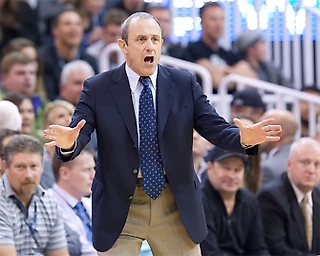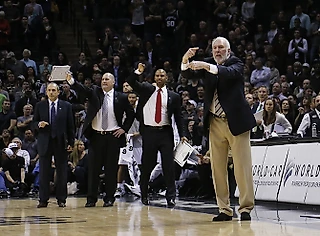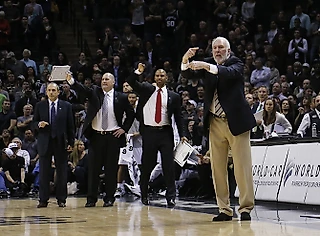Not a prêt-à-porter
Here’s a little story to start this entry. Last week I was having lunch with Arturas Karnisovas and Sam Hinkie, Vice-President of Basketball Operations for the Houston Rockets, who own Real Madrid’s back-up point guard Sergio Llull’s rights. And at some point during the conversation Sam asked me when exactly he could expect to read an update to the blog. So, as you see, I had an additional incentive to write this post. Now, let’s get it underway.
The trip to Moscow with Real Madrid presented me with the opportunity to see old friends and colleagues. I met everybody here. We visited Andrey Vatutin’s office where we watched Maroussi – CSKA game. I’d say sitting there, watching my former team is something I would’ve never expected to happen. There were some mixed feelings and I have to admit that at some point I got close to being upset about CSKA players’ mistakes and happy for their good execution. And I was clear-cut delighted when Victor Khryapa scored that incredible basket because I didn’t want to bring bad luck to CSKA.
Anyway, we spent a lot of time together and I received plenty of gifts from everybody including my great tennis mate and currently vice president of the club Yuri Yurkov, vice president Natasha Furaeva, assistant coach Dima Shakulin, athletic trainer Gosha Artemyev – everybody. The following day many of those people went to Khimki to see the game and it gave me an additional source of nervousness, because I wanted Real to perform well in front of them. Some of my CSKA friends even stayed and waited for me after the game to give their support and wish me good luck. I really wanted my team to win, but unfortunately we had way too many ups and downs, committed too many mistakes down the stretch and Khimki deserved to beat us.
Lately I’ve been thinking about the differences between my first year with CSKA and my first year with Real Madrid. You see, these are two great clubs, two great organizations, two excellent teams. But I was in a different situation when I came to Moscow. At that time I was replacing the legendary Dusan Ivkovic who’d done an excellent job with CSKA. And I realized that with me coming from Italy – even though by that time I’d already won Euroleague twice with my Bologna teams and reached Final Four with Benetton Treviso – the atmosphere was quite skeptical. The general attitude was “Well, let’s see who’s this guy whom Sergey Kushchenko brought in to coach CSKA”. That gave me the opportunity to start working and not worry about asking for extra patience.
Up to now it hasn’t been the same here in Madrid. My signing with the club is considered a big addition, a major move by the President Florentino Perez. For the local media the common thinking is “Ettore Messina is with the club so it’s going to be very strong for sure”. And once you get past those first days of excitement, such situation puts a chip of additional expectations on your shoulder which is something I would’ve rather avoided.
In many articles the team has been labeled as “Real Madrid of Ettore Messina”. I think things like that can affect the players who ultimately are the most important participants of the game. I’ve always believed that coaches do the biggest part of their job helping select the players and then organizing the team in the daily workouts and assuring it’s prepared for the games. The coach for me is not some sort of a chess player who moves pieces on the game board. Any team is first and foremost a players’ team. It’s their family, their home. Players have to create the team’s identity and take the responsibility. What I can do is help them understand this, help the players become responsible for the team. I realize it’s only natural that very good years with CSKA created high expectations; I just hope this doesn’t affect my mentality and my work.
Usually, things don’t go well for my teams early in the season. I’ve been trying to find a reason for that for a long time. It happened in Bologna (both times I was appointed a head coach there), in Treviso, it happened with CSKA. Here in Madrid it’s even more difficult because we have eight new players and each of them has a hard time adjusting to the coach’s demands and figuring out his role in the team.
I guess I could agree with the notion that sometimes bigger clubs have more trouble adjusting to the off-season changes than the smaller ones. Perhaps that’s because those teams usually sign top players who are used to getting the spotlight. For such guys it could be quite challenging to step back and accept a smaller role. And I’m not talking about selfishness or bad will here. It’s just when you get many big names on the roster it means some of them will have to get used to fewer spotlights, less freedom, reduced playing time. That’s why sometimes supposedly strong teams don’t fare well in the beginning of the season. If you want an example, just look at Panathinaikos. Last year they won Euroleague but the club struggled mightily until the Top 16 stage. That one big win they got in Malaga turned their season around. And Barcelona, the side that won Liga Espanola and reached the Final Four where almost beat us (I mean CSKA), also had ups and downs until they pulled an upset of Tau Ceramica. From that point on Barcelona dominated the Spanish League. So, it takes time but the important thing is to have enough talent to keep winning despite all the obstacles. Even if those wins are not all that pretty.
Personally, as I already mentioned in this blog, I consider myself a tailor whose job is to create the best possible suit for the team. I’m not a prêt-à-porter guy; I don’t produce those “ready to wear” clothes. I’m like a man who makes a suit that’s supposed to fit its owner perfectly. That means it takes time for me to understand what’s best for the team both defensively and offensively. Like, we can defend a pick-and-roll in many different ways. And the way we defended it with CSKA could be ill-suited for a team that’s not as powerful and at the same time is much quicker than CSKA. We have to adjust our pick-and-roll defense, adjust principles of defensive rotations, etc. It’s my job to define through experiment what we should do.
Same goes for the offense. With CSKA, we didn’t run a lot of pick-and-rolls. We liked to create post-up opportunities for our bigs and set plenty of off-the-ball screens for the shooters. But here in Madrid day by day I become more and more confident that this is a team that should use pick-and-rolls more often. We’ve got a lot of frontline players who can pick and pop out, which could give us versatility as far as offense is concerned. At the same time, it’s important not to overlook posting-up that forces defenders inside and creates space for our shooters on the perimeter.
Figuring all this out takes a while and in the meantime we’re not playing consistently and sometimes lose games. Players just need to know that what we’re trying to do is find a common way to see and play basketball. I don’t believe in imposing my ways on them. I want to be clear on this – a team has to play in a disciplined way. But that does not mean always looking over your shoulder, trying to execute something under the orders of some policeman. “Disciplined” here means always able to understand who’s in the best position to take a shot and being ready to take the responsibility of shooting the ball without passing it to somebody who’s not in a good position. Also, it means to know how important it is to sacrifice on defense and stop your opponent from getting easy baskets. This kind of self-discipline and toughness is something every team has to develop if it wants to compete and be victorious.
Right now we’re in the process of becoming a competing team, because only teams that can compete have a chance to win. It’s something fans and people who look from the outside don’t always understand. In their opinion, if a team has a competent coach and good players, then it’s all simple and victories will come. But it’s not like this. The first thing is to stop being just a group of individuals and become a team that can compete. It’s vital to understand how difficult it is and how mentally tough you should be in crucial moments of a game. Basically, if you want to win, sometimes you have to play like those great tennis legends who don’t make unforced errors at all. That’s exactly what we couldn’t do in Khimki, by the way. And that’s the biggest reason we lost that game.







